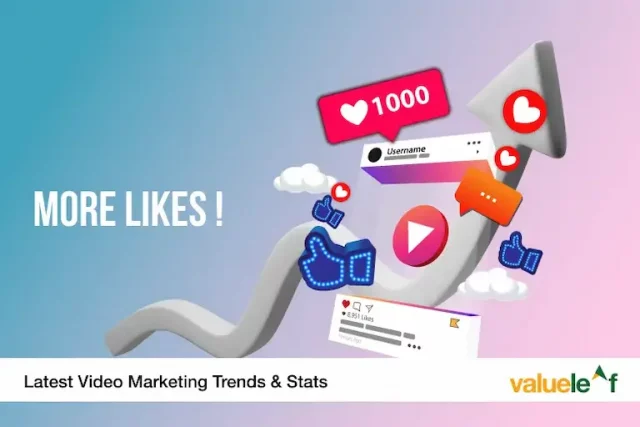Business and marketing is ever-evolving. In this constantly evolving industry, staying relevant and effective is of utmost importance. Also, to match the fast-changing digital world, we need a marketing strategy that is also continually changing. Social Media Marketing Trends
That’s where social media advertising comes in.
The importance of social media marketing cannot be understated. It can connect people, facilitate communication, provide information, offer entertainment, and create opportunities for personal and professional growth. While there are challenges associated with social media use, its positive impact on various aspects of life is undeniable.
Let’s begin by talking about the what and why of social media marketing.
Social Media Marketing: What And Why?
Social media marketing is a form of digital marketing that utilizes trending social media platforms to promote products, services, or brands. It involves creating and sharing content on these social media networks to achieve marketing and branding goals.
The primary objective of social media advertising is to increase brand awareness, drive website traffic, and generate leads or sales.
To get started with social media marketing, consider these questions:
- Goals: What do you want to achieve with social media marketing?
- Target audience: Who are you trying to reach?
- Platform selection: Which social media platforms will you use?
- Content strategy: What kind of content do you aim to create?
- Budget: How much do you plan on spending for social media marketing?
So, Why Are Trends Important?
These trends hold significance for multiple reasons.
- Firstly, they reflect the evolving nature of social media and how consumers engage with it.
- Second, these trends provide brands with new opportunities to reach their target audience and achieve their marketing goals.
- Third, these trends can help brands build stronger relationships with their customers.
Now, Let’s Look At The Upcoming Trends Of Social Media Marketing
After discussing much about social media marketing’s past and future, it’s time we turn our focus toward what lies ahead. From innovative technologies to changing consumer preferences, we’ll look at the pivotal trends that demand our attention and adaptation.
Video Content Dominance
Why It Matters:
Video content continues to captivate audiences, and short-form videos, in particular, are easily consumable and shareable. They allow for creative storytelling and can quickly convey your brand message.
How to Implement It:
- Short-Form Video Platforms: Embrace platforms like TikTok and Instagram Reels to create engaging, short-form videos.
- Educational Content: Share how-to videos, product demonstrations, or educational content to provide value to your audience.
- User-Generated Content Challenges: Encourage users to create and share their videos related to your brand through challenges or contests.
Augmented Reality (AR) Experiences
Why It Matters:
Augmented Reality (AR) experiences provide users with immersive and interactive content, enhancing engagement and leaving a lasting impression. By merging the virtual and physical worlds, AR creates a unique user experience that goes beyond traditional marketing methods.
How to Implement It:
- AR Filters and Lenses: Create branded AR filters or lenses on Instagram and Snapchat for users to engage with your products creatively.
- Virtual Try-Ons: Implement virtual try-on experiences, enabling users to visualize products before making a purchase.
- AR Games and Challenges: Engage your audience by developing AR games or challenges related to your brand.
Ephemeral Content
Why It Matters:
Ephemeral content, such as Stories, capitalizes on the Fear of Missing Out (FOMO), thereby creating a sense of urgency and exclusivity. It encourages frequent interactions and keeps your brand on the top.
How to Implement It?
- Behind-the-Scenes Content: Offer a glimpse behind the curtain, showcasing day-to-day operations or team activities to humanize your brand.
- Limited-Time Offers: Promote time-sensitive discounts, promotions, or product launches exclusively through ephemeral content to drive immediate action.
- Interactive Polls and Questions: Use interactive features like polls and questions to encourage audience participation and gather valuable feedback.
Chatbots and AI-Powered Customer Service
Why It Matters:
Chatbots and AI-powered customer service enhance user experience by providing instant responses and guidance. They ensure 24/7 accessibility, improve efficiency, and gather valuable customer data.
How to Implement It:
- Automated FAQs: Implement chatbots to handle frequently asked questions, providing quick and accurate responses.
- Personalized Recommendations: Use AI to analyze user behavior and provide personalized product recommendations or content suggestions.
- Integration with Messaging Apps: Integrate chatbots with popular messaging apps to meet users on platforms they already use for communication.
Inclusive Marketing
Why It Matters:
Inclusive marketing celebrates diversity and authenticity, resonating with a wider audience. It builds trust and fosters a sense of belonging among consumers who appreciate brands that value and represent diverse perspectives.
How to Implement It:
- Diverse Representation in Content: Ensure that your marketing materials represent a variety of ethnicities, genders, abilities, and backgrounds.
- Collaborate with Diverse Influencers: Partner with influencers who align with your brand values and bring diverse perspectives to your audience.
- Support Social Causes: Actively engage in and support social causes that promote inclusivity and diversity, showcasing your commitment beyond marketing.
All In All,
Social media marketing is rapidly evolving, and to stay competitive, businesses must be attuned to the latest trends.
Embracing these trends is not just about staying relevant; it’s about creating meaningful connections with your audience in a digital industry that is more crowded and competitive. By jumping on these trends, marketers can connect better with their audience, boost brand visibility, and grow their business. Whether through engaging videos or authentic influencer partnerships, businesses have the opportunity to adapt and lead the way into a new era of digital connectivity and brand success.
Here’s to another year of innovation and growth!
Frequently Asked Questions
Q. What are the latest social media marketing trends?
A. The latest social media marketing trends include a continued focus on short-form video, the rise of social commerce, and the growing importance of community building.
Q. What are the top social media platforms for marketing?
A. The top social media platforms for marketing in 2023 are Facebook, Instagram, YouTube, TikTok, and LinkedIn.
Q. How can I stay up-to-date with social media marketing trends?
A. To stay up-to-date with social media marketing trends, you can follow industry blogs and newsletters, attend webinars and virtual events, and experiment with new platforms and features.
Q. What are the best social media marketing strategies for small businesses?
A. The best social media marketing strategies for small businesses are to define your target audience, choose the right platforms, develop a content strategy, engage with your audience, use visuals, run ads, and track your results.
Q. What are the most effective social media marketing tools?
A. The most effective social media marketing tools are those that help you save time, manage your social media presence across multiple platforms, and track your results. Some popular tools include Hootsuite, Buffer, Sprout Social, and Sendible.
Q. What is the future of social media marketing?
A. The future of social media marketing is expected to be dominated by video content, social commerce, and artificial intelligence.



